|
|
|
Sort Order |
|
|
|
Items / Page
|
|
|
|
|
|
|
| Srl | Item |
| 1 |
ID:
125075
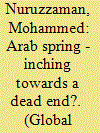

|
|
|
|
|
| Publication |
2013.
|
| Summary/Abstract |
A high degree of pessimism continues to hold a strong grip over the enthusiasts of democracy in the Arab world. In the last more than two years, the popular uprisings for social and political change have stalled in Bahrain, Syria, and Yemen. In Egypt, Libya, and Tunisia, where the populace succeeded in toppling the authoritarian rulers, the situation did not change that much. Violence, conflicts, and killings of political opponents disturbingly characterize all the Arab countries affected by the popular uprisings. In Syria, the government and opposition forces are locked in a deadly conflict with neither side being able to make a decisive breakthrough. The Egyptian army overthrew the country's first democratically elected government, headed by the Muslim Brotherhood, on 3 July 2013. On the whole, the success rate of democratization is so far disappointing. That begs the question whether the Arab popular uprisings for democratic change, what the media has conveniently dubbed the 'Arab Spring', are failing or still enduring.
|
|
|
|
|
|
|
|
|
|
|
|
|
|
|
|
| 2 |
ID:
131909
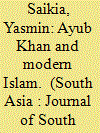

|
|
|
|
|
| Publication |
2014.
|
| Summary/Abstract |
Pakistan is viewed today as a haven for fundamentalist Islamists. This essay probes the genealogy of Pakistan's Islamisation by focusing on the rule of President Ayub Khan (1958-69) and extends to the war of 1971 and the dismembering of Pakistan during Yahya Khan's presidency. I trace Ayub Khan's project of 'modernising Islam and the nation' by probing three sites: the transformation of the Pakistani military into a jihadic army; the re-writing of history to craft an Islamic identity; and the reformation of East Pakistani Bengalis to make them 'good Muslim subjects'. Ayub Khan's experiment was a failure, leading to the violent dismembering of the country in 1971, yet an ethical imaginaire of renewing the commitment to creating a humanistic moral community continues to be an ongoing quest in Pakistan, as reflected in my investigations of the oral testimonies of war veterans. Fulfilling these ethical concerns requires critical evaluation of the roots of Islamisation in Pakistan, beginning from the period of Ayub Khan's presidency.
|
|
|
|
|
|
|
|
|
|
|
|
|
|
|
|
| 3 |
ID:
131477
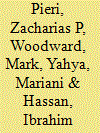

|
|
|
|
|
| Publication |
2014.
|
| Summary/Abstract |
This paper examines the concept of (public) sin as well as efforts to counteract sin from the perspective of Islam. The understanding that hisba, the prohibition of vice and enjoining of virtues, are a responsibility of both the state and the community is common in historical and contemporary Muslim societies. Where the state cannot or does not provide means for countering (public) sin, the perception for some Muslims is that the responsibility on the community and individuals to do so increases. Based on ethnographic research in Britain, Nigeria, Indonesia, Malaysia, and Singapore, the paper highlights examples of how sin has been defined amongst Muslim communities as well as the methods and rationales given to justify the forbidding of sin as a collective and communal public obligation. As the world becomes more integrated, there is growing concern amongst Muslim communities that sin is becoming the norm, leading society to degeneracy, that people who would not have otherwise sinned are influenced to do so. Common features in forbidding sin across Muslim communities have appeared, often focusing on what are seen as moral issues such as dress codes, music, gambling, alcohol, smoking, and the mixing of men and women in public. The forbidding of sin has resulted in attempts to introduce "Shari'a Zones" in some predominantly Muslim areas of London, whilst in Indonesia, this has given rise to the Islamic Defenders Front and in some Northern Nigerian states to the reintroduction of the criminal codes of the Shari'a.
|
|
|
|
|
|
|
|
|
|
|
|
|
|
|
|
| 4 |
ID:
131791
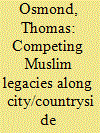

|
|
|
|
|
| Publication |
2014.
|
| Summary/Abstract |
Between the Middle East and Eastern Africa, the city of Harar is often considered as the main historical centre of Islam in Ethiopia and the Horn of Africa. Until recently, the cultural hegemony of the Muslim elites inhabiting Harar was commonly opposed to the almost pagan behaviours of the Oromo - or 'Galla' - farmers and cattle herders living in the wide rural vicinity of the town. The 1995 Constitution provided the different 'ethnolinguistic nationalities' of the new Ethiopian federation with the same institutional recognition. However, the institutionalisation of the two Harari and Oromo 'nationalities' seems to foster the historical duality between the city-dwellers and their close neighbours. This article proposes another political history of Harar and its ambivalent Oromo partners through the local dynamics of the Muslim city/countryside models. It reveals the both competing and complementary orders that have probably bound together the populations of Harar and its rural hinterland for more than five hundred years.
|
|
|
|
|
|
|
|
|
|
|
|
|
|
|
|
| 5 |
ID:
145920
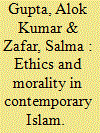

|
|
|
|
|
| Summary/Abstract |
Scientific temperament and technology has made deep inroads into life of human beings in twenty-first century. Human beings are adopting scientific values with the passage of time. Contemporary world is more willing to believe in scientific acts based on logical reasoning. The growth in scientific temperament among individuals has severely undermined the role of religion in life of individual and society. On the one hand religion demands unquestionable obligation of human beings and on the other hand, people still continues to believe in “luck or Kismat”. Large numbers of people despite of their scientific values continue to believe in the power of unseen forces. So, there still continues to be an overlapping between science and religion and the values attached to it.
|
|
|
|
|
|
|
|
|
|
|
|
|
|
|
|
| 6 |
ID:
125047
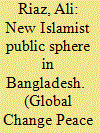

|
|
|
|
|
| Publication |
2013.
|
| Summary/Abstract |
Historically, Bangladesh has a strong and culturally embedded vibrant public sphere. The Bangladeshi public sphere always consists of a multiplicity of publics. The idea of public sphere in Bangladesh was based on the idea of secular rationality or religious neutrality. However, the situation is changing; attempts are being made to create an Islamist public sphere. This paper highlights two examples of this effort to foster the Islamization of the public sphere: production of Islamist fiction and founding women's discussion groups. It argues that the emerging Islamist public sphere in Bangladesh only subscribes to one interpretation of Islam and that the traditional authorities are now being replaced by the Islamist interpretation advanced by ideologues. It further argues that the absence of reference to local syncretistic traditions in the new Islamist discourse makes its authenticity suspect.
|
|
|
|
|
|
|
|
|
|
|
|
|
|
|
|
| 7 |
ID:
125037
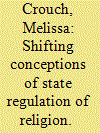

|
|
|
|
|
| Publication |
2013.
|
| Summary/Abstract |
This article seeks to understand how and why states regulate the activities or affairs of religious communities. It does so through a case study of the Indonesian Draft Law on Inter-religious Harmony. The article draws out three general considerations to the study of the dynamics of state regulation of religious affairs: situating modern state approaches to the regulation of religion in historical context; recognizing the framework within which state and religion is structured; and acknowledging the influence of legal norms other than state law. The Indonesian Draft Law on Inter-religious Harmony addresses key debates between Muslims and Christians and within Islam, and it draws upon existing policies of the Ministry of Religion and also of the fatwa of the Indonesian Ulama Council. The shift in state attempts to regulate religion is therefore related to the dynamic and contested nature of the relationship between the branches of government and religious authorities in democratic Indonesia
|
|
|
|
|
|
|
|
|
|
|
|
|
|
|
|
| 8 |
ID:
134223
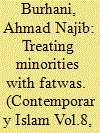

|
|
|
|
|
| Publication |
2014.
|
| Summary/Abstract |
The term "minority religious community" in the Muslim country of Indonesia refers not only to those embracing religions other than Islam, but also to minority groups like the Ahmadiyya. Recently, the treatment of Ahmadis has been worse than the treatment of non-Muslims. This article, therefore, intends to study the status of 'deviant' groups under Islamic law and the treatment of them in Muslim society. Specifically, this article addresses the following questions: How did ulama in the past define and treat minority groups? How do contemporary Sunni ulama define and treat the Ahmadiyya? What is the status of this group under Islamic law? Are they apostates, heretics, or unbelievers? And what are the legal consequences of these charges? To answer these questions, this article employs two methods. First, for theoretical treatment of minority groups in the past, this article focuses its analysis on al-Ghaz?li's Fay?al al-tafriqa and Fa??'i? al-b??iniyya. Second, following a discussion of classical Islam, the article moves to contemporary time by analyzing fatwas against the Ahmadiyya from five institutions: the R?bi?a al-'?lam al-Isl?m?, Majelis Ulama Indonesia (MUI), Muhammadiyah, Council of the Islamic Fiqh Academy of the Organization of Islamic Cooperation (OIC), and Nahdlatul Ulama (NU). This article argues that, first, fatwas against the Ahmadiyya issued by these institutions were intended as a device to sustain orthodoxy of umma and, second, orthopraxy or devoutness in observing religious rituals, as practiced by the Ahmadis, does not exempt them from the charge of apostasy because theologically they are believed to deviate from orthodox beliefs.
|
|
|
|
|
|
|
|
|
|
|
|
|
|
|
|
|
|
|
|
|